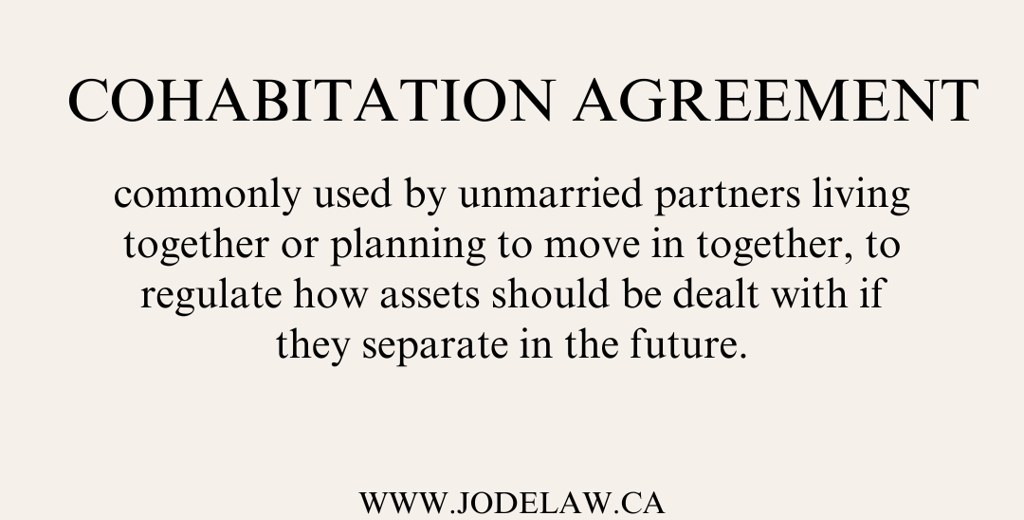WHY YOU NEED A COHABITATION AGREEMENT
CONTRACTS
Author: Jumi Odepe


Cohabitation agreements are used mostly by unmarried partners. As more couples choose to live together without formalizing their relationship through marriage, the importance of understanding legal agreements becomes apparent. Unmarried partners are not treated the same way as legally married couples in most places in Canada, cohabitation agreements serve as a guide to their property and financial rights and responsibilities if they choose to live together. Read on to find out how cohabitation agreements work.
1. Clarifying Financial Responsibilities
A cohabitation agreement clarifies financial rights and responsibilities between unmarried couples. When couples live together, they share living expenses such as utilities, rent, mortgages, and groceries. A well-drafted cohabitation agreement would outline how couples would share these expenses. Are financial obligations to be split 50/50 or in proportion to each party’s income? Who is responsible for what expenses? Would both parties fully combine or separate their finances? Having this arrangement well documented in a cohabitation agreement fosters a harmonious living arrangement, preventing avoidable conflicts.
2. Protecting Property Rights
In the absence of a cohabitation agreement, properties acquired during the relationship may lead to disputes if the relationship ends. A cohabitation agreement explicitly states ownership rights over assets owned before and during the relationship. Hypothetically, both parties in a relationship could decide they are separate in property owned before and during cohabitation, and document the arrangement in the cohabitation agreement, allowing each partner to retain control over their property. If cohabiting partners part ways, cohabitation agreements guide them regarding sharing assets, finances, personal effects and debts.
3. Outlining Decision Making Responsibilities (formerly, Child Custody) and Support
Parties to a cohabitation agreement who share children typically establish provisions regarding decision-making responsibilities and support in the agreement. While this is more prevalent in prenuptial agreements, separation agreements or marriage contracts, defining these issues in a cohabitation context ensures that both parties have a mutual understanding of their roles and responsibilities toward the children, should the relationship dissolve.
4. Avoiding Lengthy Legal Disputes
Preparing a cohabitation agreement reduces lengthy and costly legal disputes in the event of a breakup. With a legally binding agreement in place, partners limit the potential for conflicts, as the terms of the relationship are clearly defined. This proactive approach to resolving issues can save time and costs. It enables both parties to move forward with fewer complications.
5. Enhancing Relationship Confidence
Lastly, creating a cohabitation agreement can serve to strengthen relationships. By discussing and agreeing upon vital aspects of your partnership, you engage in open communication, which is important for any healthy relationship. Knowing that both partners have made mutual commitments regarding financial and personal responsibilities could also increase trust.
Summary
The property and financial rights of unmarried partners living together are not always as clear as that of married couples. A cohabitation agreement can bridge that gap, it is an invaluable tool for couples living together. It clarifies financial rights and responsibilities, protects property rights, outlines childcare arrangements, minimizes legal disputes, and enhances relationship stability.
------
Author: Jumi Odepe, Principal Lawyer, Jode Law
The lawyers at Jode Law understand the Canadian legal landscape. If you want to prepare a cohabitation agreement, contact our lawyers today via email at lawyers@jodelaw.ca
The articles published by Jode Law are intended as general information only and do not serve as legal advice. By reading, the reader understands there is no solicitor-client relationship established. If you have a legal question, you may consult one of our lawyers via email at lawyers@jodelaw.ca or use the Contact Us button to drop a message.

